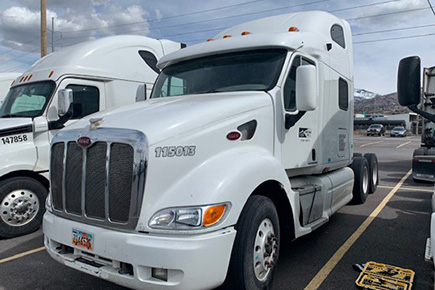
By Lisa Burr and Courtney Ehrlich
As the “Crossroads of the West” for freight traffic, Utah has a unique opportunity to reduce diesel emissions from the transportation sector through the Division of Air Quality’s (DAQ) Utah Clean Diesel Program (UCDP). Critical transportation arteries for freight distribution run coast to coast via Utah’s Interstates, and some of the country’s largest trucking companies, carriers, and suppliers use local warehousing and distribution centers as their home-base for sorting, prioritizing, and moving cargo. Hundreds of delivery trucks and diesel equipment are consolidated in these locations at the same time every day, creating a heavy presence of diesel emissions in areas that struggle to meet national air quality standards. The Environmental Protection Agency’s (EPA) MOVES (Motor Vehicle Emissions Simulator) model calculates over 24,400 tons of criteria pollutants emitted from these vehicles per year.
DAQ’s UCDP provides incentives for diesel fleet owners to retire their older, dirtier vehicles (engine model years 1999-2006) earlier than scheduled and replace them with trucks that meet the most stringent emissions standards. This results in 71%-90% reductions in nitrogen oxides, 97%-98% reductions in PM2.5 (particulate matter of 2.5 micrograms or less), and 89%-91% reductions in volatile organic compounds, according to the EPA Emissions Standards for Heavy-Duty Highway Engines and Vehicles. To demonstrate the retirement of an eligible vehicle, participants are required to submit a video showing a three-inch-by-three-inch hole in the engine block and that both sides of the chassis rails are cut all the way through.
Michael Lakey, a recent participant of the grant and President of a local trucking business, Lakey International, describes his experience saying, “The Utah Clean Diesel Program helped us upgrade some of the older trucks in our fleet that normally would have stayed in operation for at least another five years. The 25% funding that was provided for the cost of the new truck was a tremendous help and allowed me to move forward with the truck upgrades sooner than I would have otherwise.” Lakey International replaced two heavy-duty diesel trucks, model years 2004 and 2006, with new 2020 models and achieved a reduction of 10.7 tons of pollution over the life of the project.
More than $24 million in federal grants have been awarded through the Utah Clean Diesel Program since 2008, resulting in thousands of tons reduced from diesel emissions. Approximately $9.3 million remains available for heavy-duty diesel vehicle and equipment replacement projects.
Applications are being accepted on a rolling first-come, first-serve basis. Eligibility, criteria, funding amounts, and instructions for how to apply are available at cleandiesel.utah.gov.
Eligible Projects and Funding Percentages
| Eligible Projects | Funding |
|---|---|
| Vehicle or Equipment Replacements | Up to 25%
|
| Engine Replacements | Up to 40%
|
| Highway Idle-Reduction Technologies | Up to 25% for long-haul trucks (Up to 100% funding available if bundled with a Verified Engine Retrofit Technology) |
| Electrified Parking Spaces (Truck-Stop Electrification) | Up to 30% |
| Locomotive Idle-Reduction Technologies | Up to 40% |
| Low-Rolling Resistance Tires | Up to 100%, if bundled with diesel retrofit |
| Aerodynamic Technologies and Verified Low-Rolling Resistance Tires | Up to 100%, if bundled with a diesel retrofit |
| Diesel Retrofits (exhaust controls such as diesel particulate filters, diesel oxidation catalysts, etc.) | Up to 100% |

I have worked for the Division of Air Quality for 11 years. I have a Bachelor of Science Degree from Weber State University and was employed there for 13 years before coming to DAQ. Fall is my favorite season. I love being in the mountains this time of year (that’s me on the right).

Some may say I’m a Utah-transplant. I am originally from the Midwest where I grew up in a self-sustaining family with strong environmental values. Since then, I have found myself all over the map understanding how people around the world develop and sustain relationships with our planet. I have spent the last few years diving into cultures in 24 countries and living in 4 of them. Before moving to Utah in 2018, I became a graduate of the University of Dundee in Scotland where I completed a postgraduate program in Sustainability and Climate Change. These days, though, you’ll find me on skis, a mountain bike, or in a tent somewhere in the mountains.

